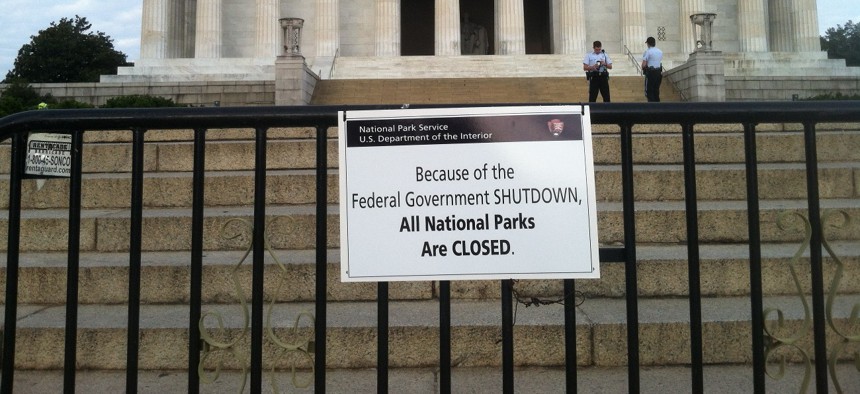
Flickr user National Parks Conservation Association
Feds Gain Early Win in Fight for Payout From 2018 Shutdown
At least 32,000 federal employees could be in line for a four-figure payday, though 25,000 are still awaiting damages awarded to them after 2013 shutdown.
A federal court on Tuesday denied an effort by the federal government to dismiss a lawsuit brought by federal employees forced to work without pay during a 35-day shutdown that began in 2018, effectively ruling federal agencies violated federal law when they failed to deliver the workers’ paychecks on time.
The lawsuit was brought by Agriculture Department employees at the Food Safety and Inspection Service, but so far includes a class of 32,000 federal workers throughout government. The same U.S. Court of Federal Claims judge, Patricia Campbell-Smith, ruled in a lawsuit following the 16-day shutdown in 2013 that the government violated the Federal Labor Standards Act and that the 25,000 feds who opted into that case were entitled to monetary damages.
Campbell-Smith has not yet ruled on the issue of damages in the newer case, instead punting that decision until after the two sides confer in January. The judge cited her previous decision, saying the same standards still apply. Heidi Burakiewicz, a partner at Kalijarvi, Chuzi, Newman and Fitch and the lead attorney on the case, said the judge found the government was already “on notice” from the previous ruling and that it had “flagrantly violated the law again.”
The government defended its actions saying the Antideficiency Act “criminalized payments during an appropriations lapse” and therefore its hands were tied. The hundreds of thousands of federal employees impacted by the shutdown eventually received pay retroactively, but they missed two paychecks, or four weeks of pay. Campbell-Smith said the government made no meaningful distinction between the plaintiffs in this case versus the 2013 lawsuit, merely noting it disagreed with that holding. The judge countered, however, that the court “continues to believe the framework set out in [the 2013 case] is appropriate and applies here.”
The 25,000 employees in that original case are still awaiting their payout. The plaintiffs encountered a series of roadblocks over the last few years identifying some of the members of the class and determining eligibility through payroll information, but Burakiewicz said they are “just about to finish.” Due to the timing of paycheck distribution during the 2013 shutdown, plaintiffs in that case are only due $290 plus any overtime they are owed. Should Campbell-Smith again award liquid damages, plaintiffs in this case would be owed a full four weeks of the federal minimum wage—or $1,160—in addition to any overtime they worked. Federal employees must affirmatively opt into the new case to receive any potential award.
Burakiewicz said she expects potential payouts to happen more quickly this time around due to lessons learned from the last suit and her firm collecting more information up front from those who sign onto the case. In a bitter twist of fate, Justice Department attorneys working on the 2013 shutdown lawsuit case and many of the human resources professionals tracking down payroll records were furloughed in 2018, leading to further delays in the payouts.
“We filed this lawsuit because these hardworking federal employees deserve to be compensated for being forced to work without pay for four full weeks during the 2018-19 shutdown,” Burakiewicz said. “Today’s decision takes us one step closer to making that happen.”
She added the government is now just more than one week out from another potential shutdown. Lawmakers are making progress toward funding agencies, however, with top negotiators agreeing to top-line spending levels for each of the 12 annual appropriations bills. Several sticking points remain, such as COVID-19 relief, the Trump administration’s insistence on new funding for additional physical barriers along the U.S.-Mexico border and whether federal workers will receive a pay raise in 2021.
House Speaker Nancy Pelosi, D-Calif., spoke with Treasury Secretary Steve Mnuchin on Tuesday to discuss negotiations for an omnibus spending package.
“I relayed my hope that the administration would support this bipartisan path,” Pelosi said. She added that additional COVID-19 relief “must be passed in this lame duck session.” The speaker has not yet suggested the stimulus funds must be tied to the other spending bills. The current stopgap spending measure is set to expire Dec. 11.







